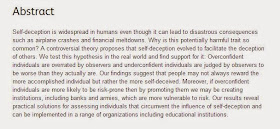In a new study
published in PLOS ONE, evidence is presented that a person who
deceives themselves as to their talent and knowledge, and thus is
more self-confident, is more likely to be judged by their peers as actually being more talented and thus are more successful than they deserve to be.
The converse is also
true. According to this study, if you have low self-esteem, you are
judged less talented by your peers and receive correspondingly fewer
opportunities, promotions and so forth.
This is an
interesting wrinkle on the “fools may go where wise people fear to
tread” meme and suggests that the best way to get opportunity and get
ahead in life is to be blindingly self-confident beyond all reason
and experience.
The problem with
this strategy comes when one tries to fake being unreasonably
self-confident. Those who are merely deluded are the stronger type
because they genuinely believe their bullshit, believe they are God's
gift to ... whatever, and thus go further than someone who merely
pretends to be delusional and has unreasonable self-confidence.
Those that try to fake their delusional self-confidence are not as
good at it, apparently, as those who are insane and thus are less
likely to be promoted.
This is bitter tea.
Many of us would try to fake delusional and unreasonable
self-confidence if we thought it would help us, but the evidence does not support this approach. Merely faking it but not
actually believing it fails to be convincing to your fellow biped
mammals whose judgment you seek to influence.
But there is a
wrinkle that might be an effective strategy. Apparently these
self-deluded and successful individuals are also more likely to
overestimate the talent and potential of their coworkers. Thus if
you feel stymied in your career, and want to get ahead, then by going
to work for a deluded and over-confident manager is a way to possibly be
given opportunities that you would not otherwise receive or merit.
The conclusion
therefore is for all of us to find the most delusional and
unreasonably self-confident people we know and go to work for them.
The abstract of the
paper is below.

No comments:
Post a Comment